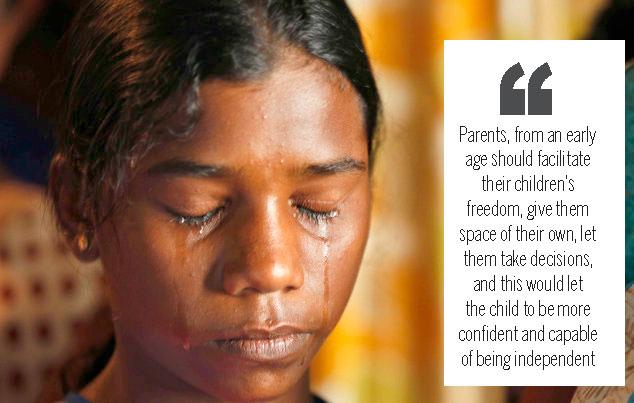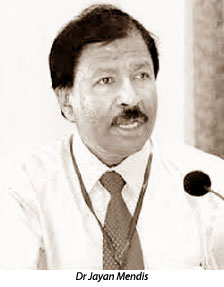
As the world moves forward with various advances young people more than any other segment of society are those at risk of mental ill health caused by their inability to cope with the stress of daily living and competitive exams.
 The Sunday Observer spoke to the Founder Director, National Institute of Mental Health ( NIMH) and Consultant Psychiatrist Dr Jayan Mendis to share his expertise in dealing with this vulnerable group.
The Sunday Observer spoke to the Founder Director, National Institute of Mental Health ( NIMH) and Consultant Psychiatrist Dr Jayan Mendis to share his expertise in dealing with this vulnerable group.
Excerpts…
Q.The GCE A.L exam ended on September 1. Students who sit this exam are adolescents who have to struggle with their bodily hormonal changes as well as cope with their studies in this fiercely competitive exam. As the Founder Director of the National Institute of Mental Health (NIMH) and Consultant Psychiatrist what are the likely health impacts of this exam on the participants?
A. To answer this, we need to consider factors in three different levels. Parental attitudes, teachers’ attitudes, and student factors.
Parents believe exams will have a bearing on their children’s future and understandably want them to do well.
Pressure from parents to do well in exams is a major source of stress. But, exam performance depends on the level of intelligence of a child, good nutrition, level of competence shown in the class, the environment where the child is brought up and how well the child is equipped with handling day to day difficulties.
For teachers, they are under considerable pressure for students to perform well. They have to show statistics that the pass rate is 100% or students receive very high ranks. Some take it positively, but mostly it becomes a marathon race and the ultimate aim is to produce the results they desire without taking into consideration the students’ desires. This has become a burning problem, to train students to get top ranks, though the real purpose of the exams are different. As far as students are concerned they are under tremendous pressure and undergo strenuous training.
This could result in exhaustion leading to mental stress. This will result in the students’ lack of self-confidence and unwanted anxiety. High level of anxiety would hamper performance at the exam.
Q. Stress is one of the main problems that students have to cope with. How do they cope with stress from ambitious parents and school teachers?
 A. Yes, stress plays a major role. Stress is the no specific response of the body to any demand. Not all stress is bad. In fact, a little stress heightens concentration and improves performances on a complex task. However, beyond a certain level stress starts to negatively impact our performances.
A. Yes, stress plays a major role. Stress is the no specific response of the body to any demand. Not all stress is bad. In fact, a little stress heightens concentration and improves performances on a complex task. However, beyond a certain level stress starts to negatively impact our performances.
In Sri Lanka, education is known for its value system. The parental expectation and competitive environment are factors that increase stress levels of young children. It is important for children to be confident in what they attempt.
This process should start at home. Parents, from an early age should facilitate their children’s freedom, give them space of their own, let them take decisions, and this would let the child to be more confident and capable of being independent.
In our culture disappointments and failures are not considered as learning experiences. This has to be changed.
In schools, the students should expose them to all sorts of experiences, sports, music, learning new languages, art, literature, travel and spirituality. This would inculcate the value of being open to varied ideas and experiences of accepted wisdom.
Q. Many students lack outdoor activities, and are constantly glued to their computers or their school books, revising and re revising. Will this have an impact on the outcomes of their exam? On their health?
A. The social structure has changed dramatically over the past two decades. Both parents go to work, no more uncles and aunts living close by and many have migrated.
We see single parent families. The new advance in technologies and the introduction of TV, computers and mobile devices further distance people from being together. Therefore, most of the children live in isolation in families.
The Internet has become the source for exploring, experiencing and relating with the rest of the world. This has put them on to a sedentary lifestyle.
As we all know it can predispose children for development of non-curable diseases such as, diabetes, hypertension, obesity and dyslipidemia in future.
Studies have shown that the sedentary lifestyle itself would have a negative impact on their academic performance.
Q. Some students have been known to experience panic attacks and depression, which has sent them to hospital on the eve of their exam. Your comments
A. As I explained earlier, children are exposed to a tremendous amount of stress on the eve of the exam due to various factors.
Unwanted stress and poor coping abilities predispose them to the development of panic attacks and acute stress reactions. Some of them eventually go in to depression as well. I have seen children getting admitted to hospital with such symptoms during A/L exams.
Q. Peer bullying is another cause for stress. How do you advise students who have this problem?
A. Bullying is a serious problem for the schools, parents and the public. In addition to academic stress, bullying would certainly impair the physical and psychological wellbeing. It can lead to serious mental health issues in later life.
Q. Nutrition is an important aspect of health. Yet, many students sitting an exam starve themselves nutritionally, living on a diet of tea and skipping meals, some even sitting the exam on an empty stomach as they have had no time for breakfast. How can parents resolve this problem?
A. Maintaining a balanced diet is important for all individuals, especially, schoolchildren. It is advised to have at least 3 major meals with the inclusion of adequate fruits, vegetables and milk in your diet plan.
I have seen students starve before exams, when in fact they need more energy to satisfy the high demand. Children should be aware about the type of healthy food they require.
It has to be taught at an early age, because poor nutrition compromises both the quality of life of the schoolchildren and their potential to benefit from education.
Q. Lots of students indulge in instant foods like take aways and junk meals which lead to early development of non communicable diseases, etc. Is there a close link between academic performance and excessive junk food consumption including coke and other drinks containing stimulants which make students hyper active?
A. In general, junk food can provide immediate release of energy and the beverages that contain stimulant may improve attention and concentration for a brief period.
Q. School canteens have a Canteen Policy where healthy food is encouraged. What do you feel should be the role of school teachers in this respect?
A. There are ministerial guidelines to schools regarding healthy diet. Therefore, in schools, the Principal and the teachers should take the first step to demonstrate eating healthy food in their own canteens.
Q. The President and the Prime Minister are currently spearheading leadership and rehabilitation programmes to help young people face the future with more confidence . Do you consider this a step in the right direction?
A. Rehabilitation programs should be tailor made to suit our population. When the President and PM step in, it would certainly have a positive impact on the outcome. The aim should be that the children are able to visualize it.
Q. What do you consider are the new challenges and emerging problems that young people sitting an exam face today?
A. Firstly, there should be a proper curriculum. Students should know what kind of questions would appear in papers and what kind of answers the examiners expect.
This needs home work. Students should be able to understand the examinations and the examiners’ minds. At the same time, unethical questions should not be allowed at exams.
Q. Your message to students?
A. Students need to have a better image of themselves. If they have studied well for two years they should be happy to face the exams. There’s no point in revising the entire syllabus but they need to concentrate on the relevant materials.
They should spend more time to recollect and revise rather than wandering away for help. The need for regular meal times, exercise and leisure activities is a must. They should keep in mind that this is not the first exam they are expected to face.
Q. Your message to parents and school teachers ?
A. Do not force children to go to a field in which the child is not competent. Let them learn and excel in the field they desire.
I have seen posters and banners of students who have done very well at exams in schools.
This may hurt a child who couldn’t perform well on a particular occasion or create anxiety in someone who is expected to do well next time. Prepare kids for life, not for standardized exams.
